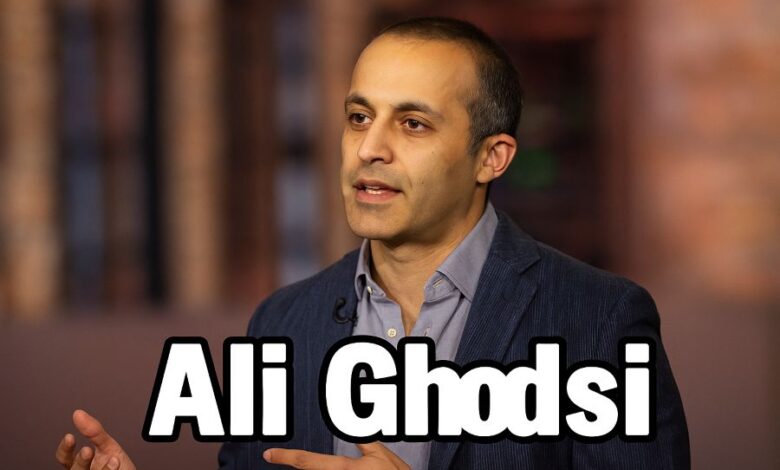Ali Ghodsi: The Visionary CEO of Databricks Driving the Future of AI and Data Innovation
A Story of Resilience, Intelligence, and Leadership in the Age of Artificial Intelligence

Table of Contents
ToggleIntroduction
Ali Ghodsi is a name synonymous with innovation, perseverance, and visionary leadership in the technology world. Known as the CEO of Databricks, he has become a driving force behind the revolution in artificial intelligence, big data, and cloud computing. Born in Iran and raised in Sweden, Ghodsi’s life journey is an inspiring tale of transformation — from a refugee child fascinated by computers to a globally respected tech leader. His story reflects not only personal determination but also the global evolution of technology toward smarter, data-driven decision-making.
Ghodsi’s expertise lies in bridging academia and business, combining the analytical rigor of a computer scientist with the strategic vision of an entrepreneur. As the CEO of Databricks, he has led one of the most successful data and AI companies in the world, helping organizations unlock the power of data for innovation, automation, and intelligence.
Quick Bio
| Attribute | Details |
|---|---|
| Full Name | Ali Ghodsi |
| Date of Birth | December 1978 |
| Birthplace | Iran |
| Nationality | Swedish-American |
| Ethnicity | Persian (Iranian descent) |
| Education | MSc, MBA – Mid-Sweden University; PhD – KTH Royal Institute of Technology |
| Profession | Computer Scientist, Entrepreneur, CEO |
| Known For | CEO of Databricks; Co-founder of Apache Spark and Mesos projects |
| Estimated Net Worth (2025) | Approximately $2.7 billion |
| Residence | San Francisco, California, USA |
Early Life and Education
Ali Ghodsi was born in December 1978 in Iran. During his early years, his family relocated to Sweden amid political and social instability. Growing up in Sweden, Ghodsi developed a passion for technology at a young age, experimenting with computers and programming. His intellectual curiosity and drive to understand complex systems would later define his academic and professional pursuits.
He earned a Master’s degree in Computer Engineering and an MBA in Logistics and Marketing from Mid-Sweden University. Continuing his education, he obtained a PhD in Computer Science from the KTH Royal Institute of Technology, specializing in distributed systems. This academic foundation prepared him to address large-scale computing challenges — a skill that would shape the future of enterprise data management.
Career Beginnings and Academic Contributions
Ghodsi’s career began in academia, where he served as an assistant professor at KTH in Sweden. His early research focused on distributed computing, resource management, and algorithms for handling large-scale networks. His academic rigor and curiosity led him to the University of California, Berkeley, as a visiting scholar.
At Berkeley, Ghodsi collaborated with world-renowned researchers in the field of distributed systems and big data. His work contributed to the development of Apache Mesos and Apache Spark — two revolutionary open-source projects that laid the foundation for modern big-data analytics and cloud infrastructure.
Rise to Prominence: Founding of Databricks
In 2013, Ali Ghodsi co-founded Databricks, a company born from the academic research at UC Berkeley. Databricks was established to make data and AI accessible to every organization, building on the success of Apache Spark. The company’s mission was simple yet ambitious — unify data engineering, data science, and analytics under one platform.
Databricks’ groundbreaking “lakehouse” architecture — which combines the best of data warehouses and data lakes — transformed how businesses handle data. Under Ghodsi’s leadership, the company quickly gained global recognition, attracting investments from leading venture capital firms and achieving multi-billion-dollar valuations.
Leadership as CEO of Databricks
Ali Ghodsi became the CEO of Databricks in 2016, steering the company through exponential growth. His leadership philosophy is rooted in collaboration, innovation, and inclusivity. As a technologist-turned-executive, Ghodsi blends scientific precision with entrepreneurial courage.
Under his guidance, Databricks expanded its platform to include AI, machine learning, and real-time analytics capabilities. The company’s services empower enterprises to extract intelligence from massive datasets, enabling breakthroughs across industries from finance to healthcare. Ghodsi’s focus on integrating open-source principles with enterprise reliability has made Databricks a cornerstone of modern AI infrastructure.
Net Worth and Sources of Income
Ali Ghodsi’s estimated net worth in 2025 is approximately $2.7 billion, largely attributed to his stake in Databricks. His primary source of income comes from his executive role and equity holdings in the company. As one of the most influential figures in the AI ecosystem, his financial success mirrors his technological impact.
His wealth, however, represents more than personal achievement — it reflects the value created by Databricks in democratizing data analytics and artificial intelligence for organizations worldwide.
Major Achievements and Recognition
Ghodsi’s contributions extend beyond Databricks. He is credited with co-authoring the concept of Dominant Resource Fairness (DRF), a pivotal model for allocating computing resources efficiently in large-scale systems. His name is associated with innovation, resilience, and thought leadership in cloud computing and data science.
Recognized by Forbes and other global publications, Ghodsi is celebrated as one of the most influential leaders in technology. His journey from academia to entrepreneurship serves as an inspiration for aspiring engineers and innovators around the globe.
Career Timeline
-
1978 – Born in Iran
-
2002–2003 – Completed MSc and MBA from Mid-Sweden University
-
2006 – Earned PhD in Computer Science from KTH Royal Institute of Technology
-
2009 – Joined UC Berkeley as Visiting Scholar
-
2013 – Co-founded Databricks
-
2016 – Appointed CEO of Databricks
-
2025 – Leading Databricks into the era of AI and data unification
Legacy and Impact
Ali Ghodsi’s legacy is defined by his commitment to making complex technology accessible. Through Databricks, he has enabled organizations to move from data chaos to intelligence-driven decision-making. His journey illustrates how innovation, when combined with persistence, can transform industries.
He stands as a bridge between academia and enterprise, proving that scientific research can lead to transformative business success. By pioneering data lakehouse architecture, he has influenced how companies worldwide manage and utilize information — cementing his place among the great innovators of the digital age.
Conclusion
Ali Ghodsi’s life and career embody a perfect blend of intellect, perseverance, and vision. From his roots in Iran to his leadership in Silicon Valley, his path showcases the limitless potential of determination and innovation. As the CEO of Databricks, he continues to shape the future of artificial intelligence and big data, driving the world toward smarter, more connected possibilities.
His story is both motivational and instructive — a reminder that with knowledge, integrity, and vision, one can redefine the boundaries of what’s possible in technology.
FAQs
1. Who is Ali Ghodsi?
Ali Ghodsi is a Swedish-American computer scientist and entrepreneur, best known as the CEO of Databricks and co-founder of Apache Spark.
2. What is Ali Ghodsi’s educational background?
He holds an MSc and MBA from Mid-Sweden University and a PhD in Computer Science from KTH Royal Institute of Technology.
3. How much is Ali Ghodsi’s net worth?
His estimated net worth is around $2.7 billion as of 2025, primarily from his role and equity in Databricks.
4. What is Databricks known for?
Databricks is a data and AI company that provides a unified analytics platform built on the lakehouse architecture, enabling businesses to manage and analyze massive datasets efficiently.
5. What is Ali Ghodsi’s biggest contribution to technology?
His leadership in developing Apache Spark and popularizing the lakehouse architecture has revolutionized modern data processing and AI adoption.
6. Why is Ali Ghodsi considered influential?
He transformed academic research into practical technology that powers leading global enterprises, making him one of the most respected figures in AI and data innovation.



